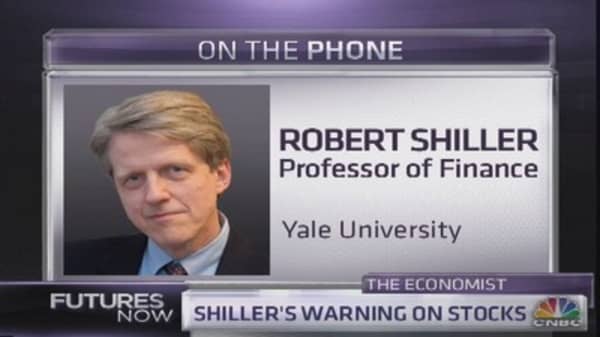As the S&P 500 approaches a fresh all-time high, what's a timid investor to do? If you're still on the sidelines, economist Robert Shiller thinks that you can still buy in to the market. He would just advise you to take it easy on the bullish enthusiasm.
"I'm not really saying don't invest in stocks," the Yale economist said Thursday on CNBC's "Futures Now." But "don't expect miracles."
After all, stocks might be more expensive that you think. The commonly used 12-month trailing price-to-earnings ratio shows that the market is currently valued at about 19 times earnings—which is only slightly higher than the historical average of 15. But Shiller's cyclically adjusted price-to-earnings ratio (or CAPE) casts things in a different light. CAPE compares the price of the market to inflation-adjusted returns from the prior 10 years, and shows that the market is now valued at 24 times earnings. That is well above CAPE's average reading of 16, and according to Shiller, that means that stocks are now somewhat expensive.
The current reading is "high by historical standards, but it's not super-high," Shiller said. "I'd say it's suggesting—based on historical evidence—real returns of something like 3 percent a year for the next decade."
Shiller says CAPE is "a better measure of price earnings, and it predicts the stock market better than the traditional" P/E ratio. But his metric has recently come under some fire.
In an August piece in the Financial Times ("Don't put faith in Cape crusaders"), Wharton professor of finance Jeremy Siegel wrote: "I believe the CAPE ratio's overly pessimistic predictions are based on biased earnings data. Changes in the accounting standards in the 1990s forced companies to charge large write-offs when assets they hold fall in price, but when assets rise in price they do not boost earnings until that asset is sold."
Instead of using S&P earnings data, Siegel suggests using the after-tax profits reflected in the government's national income and product accounts (NIPA) data. "When NIPA products are substituted for S&P reported earnings in the Cape model, the current market shows no overvaluation," Siegel writes.
In many ways this is a complicated academic argument, but the economists' dueling models have serious ramifications for the average investor. Shiller's belief that the market is relatively expensive leads him to predict that stocks won't move much higher. On the other hand, Siegel's call that stocks are reasonably priced supports bullish calls like the one he made on Aug. 6 on "Futures Now," when he argued that the Dow could easily hit 18,000 by the end of 2014.
(Read more: Siegel: Keep buying—you 'can't lose')















